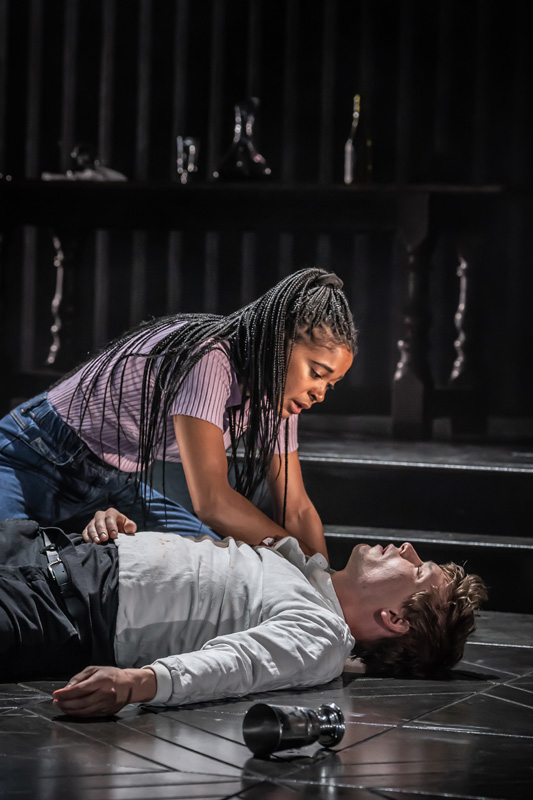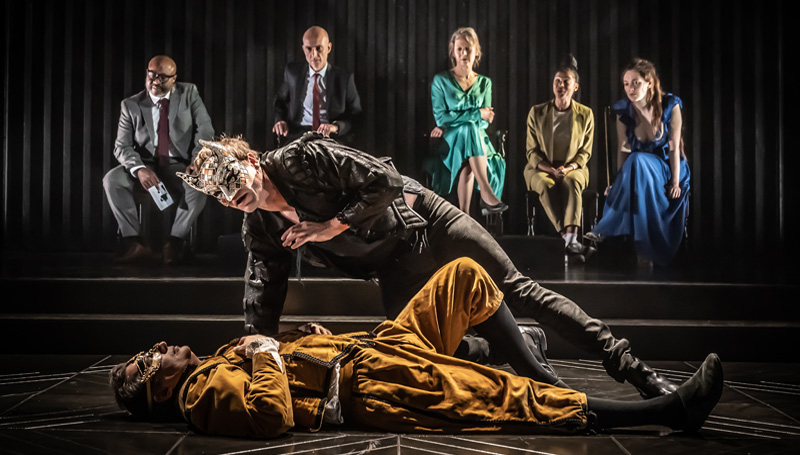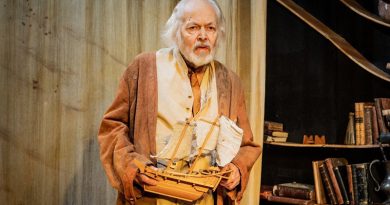“Hamlet” – Bristol Old Vic
Simon Thomas in Bristol
23 October 2022
As the UK’s oldest continually working theatre, Bristol Old Vic can boast a long line of distinguished Hamlets, stretching as far back as Sarah Siddons in 1781, William Charles McCready in 1830 through to an early appearance by Peter O’Toole in 1958 and more recently Iain Glen in the early 1990s.

Billy Howle as Hamlet.
Photo credit: Marc Brenner.
John Haidar directs the latest production of Shakespeare’s tragedy at this historic venue. His reinvention (don’t all stagings these days seem to be “reimaginings”?) borrows something from both Robert Icke’s Almeida Theatre production with Andrew Scott in 2017 and Gregory Doran’s RSC outing with David Tennant a few years earlier. So, his approach is not entirely fresh and there is a slight feeling of having seen much of it before.
Of course, any production of the play will revolve around its lead actor and this time one of our brighter young stars, and one trained in Bristol, has his chance to shine. Billy Howle has made a name for himself in recent years with appearances in films such as On Chesil Beach and the TV show The Serpent.
On screen he has a brooding and sensitive persona, which would seem entirely appropriate for the young Danish prince. He gives an accomplished performance, at times a little too full-on and lacking in contrast, but he’s nevertheless always good to watch and finds new ways of spinning the so-familiar lines. He rants, staggers, and stares in a whirlwind of passion and anguish, so that the return of sanity in the post-England scenes comes as a relief.
The evening has a startling beginning, with Hamlet spooling and rewinding a tape, like Beckett’s Krapp, which plays to the concept, spelled out in the programme notes, of Hamlet being a memory play as much as one of revenge. This theme isn’t followed through as fully as it could be, despite the bold and attention-grabbing opening, although handheld tape recorders do appear at regular intervals.

Isabel Adomakoh Young and Billy Howle.
Photo credit: Marc Brenner.
Haidar (who previously directed Headlong’s Richard III which Bristol Old Vic co-produced) puts his stamp on the play with lavish cuts and radical re-ordering of scenes. So, we begin with Claudius’s first speech, followed by Hamlet’s “What a piece of work is man”, followed apace by the “O, what a rogue and peasant slave am I” and “To be or not to be” monologues. At times, especially in the first half, it feels like “scenes from Hamlet”, with all the famous bits strung together and the arc of the play somewhat lost. It has the same sort of effect as listening to a greatest hits album, never as satisfactory as hearing the original full works. This is less apparent as the play goes on.
There is a definite feeling that this is a budget staging. The minimalist set by Alex Eales is monochrome and handsome – a twirling centrepiece that reveals steep stairways and hidden panels – but the overall feel is underproduction with a dash of blandness.
This is partly due to the use of a company of just nine actors with plenty of doubling (Ghost/Player King/Gravedigger, Guildenstern/Reynaldo/Player Queen, etc.) and not enough attention paid to differentiation between characters. So, a pair of glasses is all we get to distinguish between Rosencrantz and Laertes (Taheen Modak) which could cause confusion for spectators not familiar with the play.
Haidar brings some fine touches, which does give the evening a fresh feel. Hamlet bringing on his father’s ashes in the chamber scene to throw in his mother’s face is an insightful moment. Even for people who know the play well, the break for the interval leaves us wondering what’s going to happen next, following a shocking theatrical moment that it would not be fair to reveal here. The presence of the ghost (Firdous Bamji, probably the busiest quick-change artist of the show) at key points is nicely done, although the stylized and contrived ending of the play is for me a step too far.
Finbar Lynch is a lightweight Claudius, a weakling king easily put off his deadly path by indecision and fear. There is little sense of royalty about him or his queen, Niamh Cusack’s rather domestic Gertrude, a consequence of Haidar‘s prosaic approach to the text.
Jason Barnett as Polonius wrings some comic moments from a part that is so often tedious, but is less effective as an affected Osric. Mirren Mack vividly portrays Ophelia’s traumatic breakdown, flinging bottles of pills around in place of the usual herbs and flowers.
Running at three hours despite the cuts, this is a fast-moving and energetic evening, with total commitment from its cast. It’s not the most innovative or exciting production of Hamlet of the many in recent years but it’s far from the worst.









